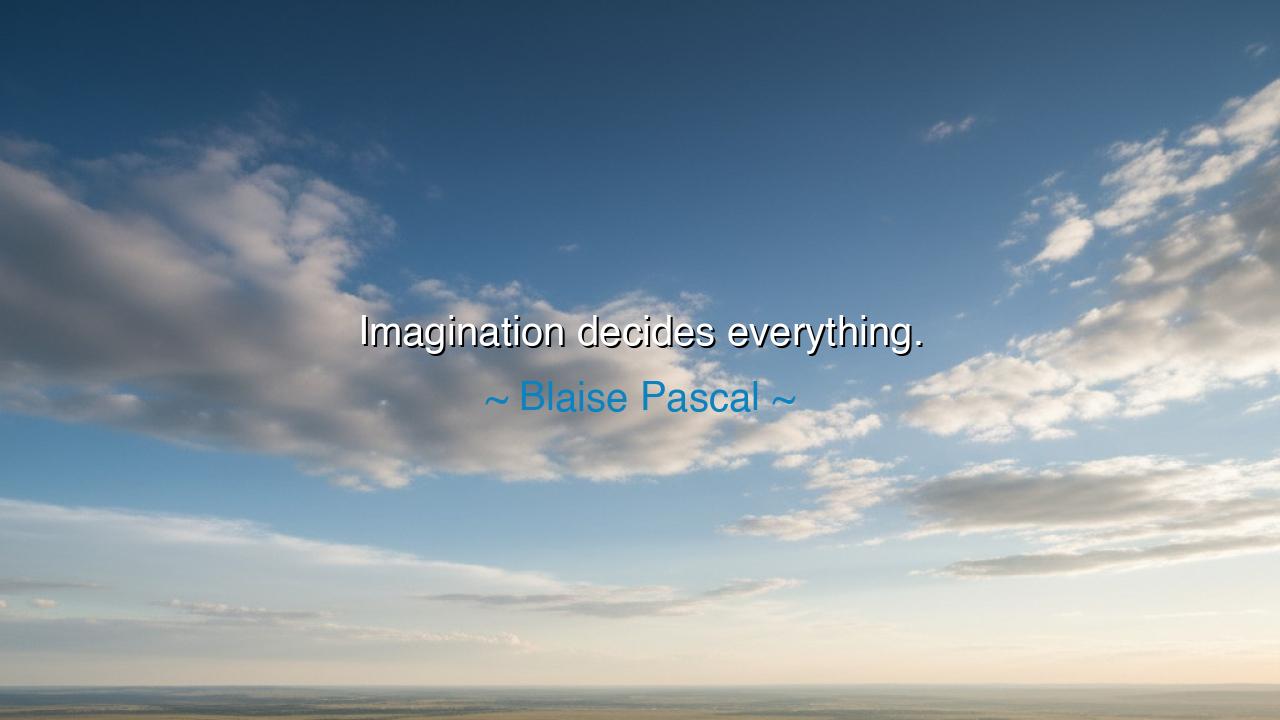
Imagination decides everything.






“Imagination decides everything.” — thus declared Blaise Pascal, the philosopher-mathematician whose mind illuminated both the mysteries of the heavens and the depths of the soul. These few words, though simple in form, contain a truth vast as eternity. In them, Pascal speaks not of idle fancy, but of imagination as the sovereign power of perception — the hidden architect of belief, knowledge, and destiny. For in the empire of the mind, it is imagination that crowns reason, that gives life to faith, that shapes what we call real. As a man who probed both science and spirit, Pascal understood that before anything can be proven, it must first be imagined.
The origin of this quote lies in Pascal’s reflections within Pensées, that treasure-house of fragments where faith and reason wrestle like twin stars. There, he explored the limits of human understanding — how reason alone cannot grasp the fullness of existence, and how imagination, though often deceptive, rules even those who deny its power. To Pascal, imagination was no mere ornament of the intellect; it was the very force that decides what man believes, feels, and dares to create. Whether in religion, science, or love, the imagination precedes action, determining the boundaries of what is possible.
He wrote in an age when the world was awakening to both mathematical order and metaphysical doubt. Through the telescope, man discovered infinity; through introspection, he discovered his smallness. Yet Pascal saw that it was the imagination that bridged the two — that gave meaning to the vastness and hope to the fragility. The same imagination that inspired the astronomer to chart the stars also drove the artist to paint them as symbols of longing. Thus, he taught that all human endeavor, whether sacred or scientific, is governed by the unseen empire of imagination.
Consider, for instance, the life of Christopher Columbus, who gazed at maps and seas and imagined another world beyond the horizon. His vision was mocked as madness, yet it was imagination, not certainty, that carried his ships westward into history. Or think of Isaac Newton, who saw an apple fall and, in that ordinary motion, imagined a law binding the universe itself. In each case, imagination did not distort truth — it revealed it. Pascal understood that all discovery begins not with evidence, but with vision; the world changes not because we measure differently, but because we imagine differently.
Yet Pascal’s insight reaches beyond invention or exploration — it enters the heart. For even our emotions, our faiths, and our fears are governed by the images we hold within. The tyrant rules through the imagination of terror; the saint redeems through the imagination of love. Two people may see the same world, but the one whose imagination is luminous will walk in joy where another walks in despair. Thus, the imagination decides not only art and science, but the very quality of life itself. It is the divine spark within the mortal clay — the shaping fire of perception.
But Pascal’s teaching carries also a warning. He knew that imagination, unguarded by truth, can deceive. “It is the mistress of error and falsehood,” he wrote elsewhere, “but also the mother of all understanding.” Therefore, he does not call us to abandon imagination, but to govern it with wisdom. Like a powerful steed, it must be guided by conscience and reason, lest it gallop into delusion. The imagination that envisions heaven may also create hell; the mind that dreams of justice may also invent tyranny. Thus, imagination is both gift and trial — the power to choose what world we dwell in.
The lesson, then, is this: nurture your imagination, for it is the soil of every creation and the root of every belief. But tend it with discernment, as a gardener tends a sacred grove. Read widely, reflect deeply, and dream boldly — for it is through imagination that you will understand the invisible, that you will see possibility in failure, beauty in sorrow, and purpose in the chaos of days. Let your imagination serve truth, not vanity; let it lift your soul beyond habit and fear.
Thus, remember the words of Blaise Pascal: “Imagination decides everything.” For in the end, the universe you inhabit is shaped not only by what you see, but by how you see it. The mind that imagines nobly lives nobly. The heart that imagines love will find it. And the soul that dares to imagine the infinite will awaken, at last, to its own eternal light.






AAdministratorAdministrator
Welcome, honored guests. Please leave a comment, we will respond soon